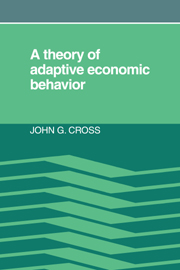Book contents
- Frontmatter
- Contents
- Preface
- 1 Introduction
- 2 Models of convergence
- 3 Behavior in the short run
- 4 Uncertainty
- 5 An application to state lottery games
- 6 An application to the problem of search behavior
- 7 Inflationary disequilibrium
- 8 Advertising and imitation
- 9 An application to migration
- 10 Conclusions
- References
- Index
- Frontmatter
- Contents
- Preface
- 1 Introduction
- 2 Models of convergence
- 3 Behavior in the short run
- 4 Uncertainty
- 5 An application to state lottery games
- 6 An application to the problem of search behavior
- 7 Inflationary disequilibrium
- 8 Advertising and imitation
- 9 An application to migration
- 10 Conclusions
- References
- Index
Summary
The various applications of an experience-driven theory of behavior that have been treated in this book have been drawn from a diverse set of fields, but with a single purpose – that of demonstrating the broad usefulness of the theory and its capacity to generate insights that fall outside the scope of the maximization paradigm. At the same time, the sacrifices that the theory has required have been minor: The general outlines and conclusions of comparative-statics equilibrium theory remain in force.
At no point in this book has there been a desire or purpose of renouncing “traditional” economic analysis. The objective has been one of supplementation, adding structure that enables us to address short-run disequilibrium situations as well as long-run equilibrium, and structure that can bring more realism to our treatment of risk and decision making over time. No challenge is intended to the proposition that, given the opportunity to gain experience, consumers and firms come to handle their affairs efficiently and effectively, and certainly no exception is taken to our belief in the capacity of market mechanisms to allocate resources among these same actors according to familiar principles. This book is not intended to stimulate a revolution in our thinking, but to demonstrate that it is possible to write down what seem to be obvious properties of economic adjustment mechanisms and to develop from them empirically useful insights that can be applied to circumstances for which the literal application of maximization theory has always seemed inadequate if not wholly inappropriate.
Equilibrium optimization
Our treatment of optimization as the (usual) equilibrium condition naturally preserves the standard welfare theorems concerning the allocative efficiency of various market mechanisms.
- Type
- Chapter
- Information
- A Theory of Adaptive Economic Behavior , pp. 179 - 188Publisher: Cambridge University PressPrint publication year: 1983



